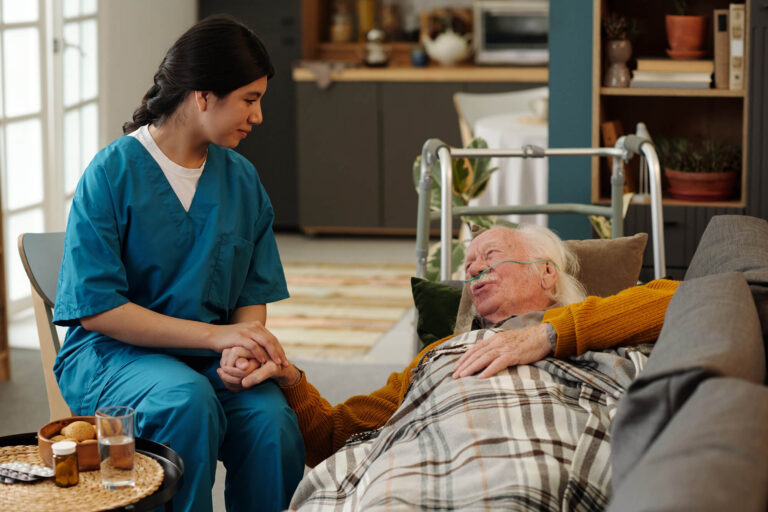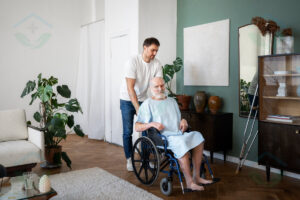Caring for an aging parent or a family member with health challenges can be overwhelming – especially when they need help both day and night. Our 24/7 home care services offer a simple solution: round-the-clock assistance in the comfort of home. In this blog, we’ll break down what 24/7 home care means, who can benefit, and how it keeps your loved ones safe and comfortable. We’ll also explore what daily home health aides do, how to find the right provider, and answer some common questions. By the end, you’ll see why having 24/7 support at home can bring peace of mind – and why Faith Home Healthcare’s 24/7 live-in service stands out as a reliable option for quality in-home care.
What Is 24/7 Home Care?
“24/7 home care” means having a caregiver available all day and night at your loved one’s home. In practical terms, this often involves a team of caregivers working in shifts (for example, two 12-hour shifts) so that someone is always awake and ready to help. Unlike part-time home care visits, 24/7 care ensures continuous, round-the-clock support – even during late nights or early mornings. This is slightly different from standard “live-in care”, where one caregiver may live-in the home and take an 8-hour sleep break. With true 24/7 care, there are no gaps in supervision, giving families reassurance that help is always on hand.
A professional caregiver providing 24/7 home care can assist with tasks at any hour, from helping your loved one get safely out of bed in the morning to being there if they need to use the bathroom at 2 AM. The caregiver’s constant presence means no moment goes unattended. If Mom wakes up disoriented or Dad needs a glass of water at midnight, someone is right there to support them. This continuous care model is all about ensuring safety and comfort around the clock, in the familiar surroundings of home.
Who Needs 24/7 Home Care Services?
Not everyone requires round-the-clock care, so how do you know if it’s time to consider 24/7 assistance? Here are some common situations and signs that a person might benefit from 24/7 home care services:
- Frequent Falls or Accidents: If your loved one has fallen recently or is unsteady on their feet, constant supervision can prevent injuries. Frequent falls are a red flag that 24-hour in-home care may be needed. A caregiver can help them move around safely and be there to assist if they lose balance, minimizing the risk of accidents.
- Wandering or Memory Issues: Individuals with Alzheimer’s or dementia who wander or become confused need continuous monitoring. Wandering can be dangerous when no one is around to intervene. A 24/7 caregiver will keep an eye on your loved one, gently redirecting them and keeping doors secure at all hours to ensure they don’t get lost or hurt.
- Chronic Illness or Disability: Those with serious medical conditions (like advanced Parkinson’s, after a stroke, or debilitating chronic diseases) often require help throughout the day and night. For example, someone bedridden or on a feeding tube may need repositioning, suction, or other care at any time. Round-the-clock care makes sure their medical and personal needs are promptly met.
- Incontinence or Nighttime Needs: If a person can’t get to the toilet alone or needs frequent changing, overnight help is crucial. A 24/7 caregiver can handle toileting, cleanup, and bedding changes with compassion and maintain a regular schedule to prevent discomfort.
- Caregiver Burnout or Absence: Sometimes the primary family caregiver cannot be available 24/7 – everyone needs to sleep, work, or take a break. If you find you can’t reliably provide care at all hours, it’s a sign you may need help. Bringing in 24/7 home care not only aids the person needing care but also gives family members much-needed respite and peace of mind that their loved one is never alone.
In short, any situation where your loved one cannot be left alone safely for long periods might call for 24/7 home care. Whether it’s due to physical limitations, cognitive decline, or simply the frailty of age, round-the-clock care can address those needs comprehensively.
Benefits of 24/7 Home Care
Opting for 24/7 in-home care comes with numerous advantages for both seniors (or other individuals in need) and their families. Here are some key benefits of 24/7 home care:
Personalized One-on-One Care: With a dedicated caregiver always present, your loved one gets individual attention whenever they need it. Whether it’s help with eating a meal, adjusting pillows for comfort, or a friendly chat over a cup of tea, the care is tailored entirely to them. This personalized approach often leads to higher quality care and a stronger bond between the caregiver and your family member.
- Safety and Fall Prevention: Continuous supervision drastically reduces the chance of accidents. If your loved one gets up at night, someone is there to steady them and prevent falls. In case of an emergency or sudden health issue, a caregiver can respond immediately and call medical services if needed. Knowing someone is awake and alert 24/7 provides tremendous peace of mind.
- Comfort of Home: With 24/7 care, seniors can age in place and stay in the comfort of their own home rather than moving to a nursing home or assisted living. Being at home means they can stick to familiar routines, sleep in their own bed, and be surrounded by personal belongings and memories. This comfort can improve their overall happiness and even health.
- Maintaining Independence: Paradoxically, having full-time help can help seniors remain more independent in daily life. How? The caregiver supports them only as needed. Your loved one can continue doing the things they can do, and get assistance with things they have trouble with. This balance lets them retain as much independence and normalcy as possible, with a safety net always there.
- Relief for Family Caregivers: 24/7 home care provides family members a much-needed break. You no longer have to be “on call” all night or worry constantly during work or errands. Knowing a qualified caregiver is with your parent or spouse allows you to rest and recharge. It eases stress and burnout for the family, so you can enjoy quality time with your loved one when you’re together, instead of being exhausted or anxious.
- Companionship: Around-the-clock care also means your loved one has someone to talk to and interact with at any time. Companionship is a big part of caregiving, sharing meals, watching a favorite show together, or just having a friendly presence can greatly improve a senior’s emotional well-being. This constant social interaction helps combat loneliness and can keep depression at bay.
Overall, 24/7 home care combines the best of both worlds – the security of a care facility (since help is always available) with the comfort and familiarity of home. It’s a win-win for safety and quality of life.
What Does a Daily Home Health Aide Do?
A daily home health aide is a trained caregiver who can assist your loved one with day-to-day activities. Home health aides (HHAs) provide non-medical care (and sometimes basic health monitoring) to make sure clients are healthy, safe, and comfortable each day. Their duties can cover a broad range of needs. Here are some of the typical tasks a daily home health aide does:
- Assistance with Personal Care: HHAs help with activities of daily living like bathing, dressing, grooming, and using the toilet. If your mom needs help showering or your dad needs someone to steady him while he puts on a shirt, a home health aide is there to assist with dignity and respect.
- Medication Reminders: While home health aides don’t give injections or medical treatments (that’s for nurses), they do help clients remember to take their prescribed medications on time. They can hand the medication container to your loved one, remind them of the dose, and record that it was taken – ensuring no dose is missed.
- Meal Preparation and Feeding: Daily aides often handle cooking or preparing simple, healthy meals. They will accommodate dietary restrictions and preferences, and ensure your loved one eats regularly. If needed, they also assist with feeding. This keeps clients well-nourished and hydrated throughout the day.
- Light Housekeeping: A tidy, hazard-free home is important for health and safety. Home health aides do light housekeeping chores – such as laundry, washing dishes, changing bed linens, taking out trash, and general cleaning up. These tasks keep the home environment clean and safe, removing clutter that could cause falls.
- Mobility and Transfer Support: If someone uses a walker or wheelchair, a home aide helps them transfer from bed to chair, or navigate the home. They offer a supporting arm when walking, help with exercises or stretching routines, and make sure any mobility devices are used correctly. This support maintains mobility and prevents injuries.
- Transportation and Errands: Many home aides can drive or arrange transportation for appointments, grocery shopping, or social outings. They might take your loved one to see their doctor, pick up prescriptions, or just go for a short walk in the neighborhood for fresh air (if the client is able).
- Companionship and Emotional Support: Just being there as a friendly companion is a big part of an aide’s job. They might chat with the client, play cards or do hobbies together, listen to stories, or watch a favorite TV program with them. This social interaction keeps the person mentally engaged and in better spirits. Family members often find that an aide becomes like an extended part of the family – providing not just care, but also genuine friendship.
In essence, a daily home health aide takes care of the daily routine things that we often take for granted, from morning until bedtime. By covering these needs, they allow seniors or disabled individuals to live at home comfortably. They also keep an eye on the person’s condition – if they notice changes (like reduced appetite, or a cut that looks infected), they can inform family or nurses early. This day-to-day support is the backbone of 24/7 home care services, ensuring nothing important is overlooked.
How to Choose the Right Home Care Provider
Selecting a home care provider for 24/7 care is a big decision. You want a service that is trustworthy, professional, and a good fit for your family’s needs. Here are some tips on how to choose the right home care agency or caregiver:
- Assess Your Needs: First, determine what level of care is needed. Does your loved one only need non-medical help (personal care, companionship, etc.), or do they require skilled nursing care at times (for example, wound care or physical therapy)? Identifying whether you need basic in-home care or more advanced home health care (medical services) will guide your choice. Make a list of daily needs – from help with bathing and meals to mobility or memory care needs. This will help you communicate clearly with potential providers about what you expect.
- Check Credentials and Reputation: Always work with a reputable, licensed agency if possible. A good home care agency will be licensed or certified as per state requirements and often bonded and insured. Research the provider’s background: How long have they been in business? Do they have positive reviews or testimonials? You can ask for references from current or past client families. An agency with a strong reputation is more likely to provide reliable, quality service.
- Caregiver Qualifications and Screening: Don’t be shy about asking how the agency hires and trains their caregivers. Do they conduct thorough background checks on all home health aides? (They should!) What certifications or training do the caregivers have? Many states require HHAs to have certain training hours and certification. Top agencies also give ongoing training, especially for specialized care like dementia. Ensuring caregivers are well-trained (CPR/First Aid certified, for example) and vetted will give you confidence in the person coming into your home.
- Services and Availability: Confirm that the agency truly offers 24/7 home care services if that’s what you need. Ask how they handle scheduling for round-the-clock shifts: do they use two caregivers per day, three? Also inquire about backup coverage, if a caregiver gets sick or can’t come, does the agency have a plan to fill that shift so you’re never without care? A reliable provider will have a system to ensure continuity. Additionally, see if they can accommodate any specific needs such as language preferences, memory care experience, or transportation services.
- Communication and Care Plans: Good home care providers will work with you to create a personalized care plan for your loved one. They should do an initial assessment of needs and home safety, and involve you and your family in planning the schedule and tasks. Ask how they monitor quality is there a supervisor (like a nurse or care manager) who checks in periodically? How do they communicate with you about any issues or updates (daily logs, phone calls, etc.)? Clear communication is key to a smooth partnership.
- Understand the Costs and Insurance: Finally, be sure to discuss the cost of 24/7 care and what payment options are available. Round-the-clock care is a significant commitment – it can range roughly from $10,000 to $20,000+ per month in the U.S. for full 24-hour coverage, depending on location and needs. Most agencies charge an hourly or daily rate. Ask for a detailed breakdown of fees. Also find out if they accept any insurance or benefits: for example, Medicare won’t cover 24/7 custodial care
meetcaregivers.com
but if medical home health services are needed for a few hours, those might be covered. Medicaid in some states or long-term care insurance policies might help offset costs if applicable. A good provider will be transparent about costs and help you explore payment options or veterans programs if relevant.
Taking these steps will help you find a home care provider that you can trust with your loved one’s well-being. It’s okay to meet with multiple agencies, ask lots of questions, and involve your loved one in the decision if they’re able. The goal is to choose a caregiver or team that makes everyone feel comfortable and confident.
FAQs About 24/7 Home Care
Q: When should I consider 24/7 home care for my loved one?
A: Consider 24/7 home care if your loved one’s health or safety would be at risk when left alone for extended periods. Warning signs include frequent falls, wandering off or getting confused at night, forgetting to turn off appliances, or a recent serious diagnosis that requires close monitoring. Also, if family caregivers are exhausted or unable to provide constant care, it’s time to look at 24/7 professional help. Round-the-clock care can give you peace of mind that someone is always there to handle emergencies or needs that arise at any hour.
Q: How much does 24/7 in-home care cost?
A: The cost of 24/7 home care varies based on location, the level of care needed, and the agency’s rates. It is generally one of the more expensive care options because you are essentially paying for multiple caregivers or a caregiver’s extended hours. As a rough estimate, around-the-clock home care can cost upwards of $15,000 to $20,000 per month in many areas. Some places might charge $200 to $300 per day or more. It’s important to get a personalized quote from providers, since needs differ for instance, if your loved one requires two-person assistance for transfers or has specialized medical needs, costs could be higher. While it is a significant expense, remember that this covers comprehensive care day and night. Families often find ways to manage costs by using long-term care insurance, veterans’ benefits, or pooling family resources, and many feel the safety and comfort it provides are worth the investment.
Q: Does insurance or Medicare cover 24/7 home care services?
A: Medicare (the federal health insurance for seniors) does not cover long-term 24/7 custodial home care. Medicare will pay for short-term home health services (like nursing visits or therapy) if prescribed by a doctor, but it won’t pay for an aide to assist with daily living on a 24-hour basis indefinitely. Medicaid, which is state-run insurance for low-income individuals, may cover some in-home care if your loved one qualifies, but it often has limits and usually won’t cover round-the-clock care unless under specific waiver programs. Some states have Medicaid programs or waivers that support extensive home care for those who would otherwise need nursing home placement – you’d need to check your state’s offerings and eligibility. The most likely coverage for 24/7 home care comes from long-term care insurance policies (if your loved one has one) or certain VA (Veterans Affairs) benefits for veterans and their spouses. Many families, however, end up paying for 24/7 care privately out-of-pocket. It’s a good idea to talk to the home care agency about payment options – they often have staff who can guide you through what insurance or programs might help in your situation.
Q: What’s the difference between 24-hour care and live-in care?
A: Both terms imply someone is there to help day and night, but the setup is different. 24-hour care usually means caregivers work in shifts (for example, 2 caregivers doing 12 hours each, or 3 caregivers doing 8 hours each). Caregivers are awake and working their entire shift, ensuring constant alert coverage. Live-in care typically means one caregiver lives in the home and is on duty for a full day (24 hours), but they are allowed a long break for sleep (usually at night) and some downtime. Live-in caregivers often work several days on, then rotate with another caregiver. The key distinction is that live-in care assumes the caregiver can sleep at night (so it works only if your loved one doesn’t require attention every single hour). Live-in can be more affordable since you’re not paying multiple people, but there may be gaps when the caregiver is resting. 24/7 shift care, while more expensive, provides continuous, uninterrupted assistance because caregivers don’t sleep on their shift. Many agencies, like Faith Home Healthcare, use the term “24/7 live-in care” to describe a service that combines the benefits essentially ensuring a caregiver is always present in the home, day and night, to attend to the client’s needs.
Q: Can I trust a stranger to care for my parents 24/7?
A: It’s completely normal to feel nervous about hiring a caregiver, especially for round-the-clock care. The key is to choose a trustworthy, professional agency (as discussed above) or thoroughly vet any private caregiver. Reputable home care agencies go to great lengths to screen their staff – including background checks, reference checks, and training. Many will let you meet and interview the caregiver beforehand to see if it’s a good personality match. During care, there are often check-ins or even technology like care monitoring apps or daily logs so you can stay updated. Over time, most families find that a good caregiver becomes almost “like family”. They provide compassionate care and companionship, and you’ll develop trust as you see your loved one safe and happy under their care. Always maintain open communication with both your loved one and the care provider. If something doesn’t feel right, agencies can work with you to find a better fit. Trust is built gradually, but knowing trained professionals are caring for your parents around the clock can ultimately bring great relief.
Why Choose Faith Home Healthcare for 24/7 Home Care Services?
When it comes to ensuring the very best care for your loved one, Faith Home Healthcare shines as a top choice for 24/7 in-home care. Faith Home Healthcare’s 24/7 live-in service is more than just around-the-clock assistance – it’s about providing dependable, compassionate support that families can trust. Here are a few reasons why Faith Home Healthcare stands out:
- Trusted and Reliable Care: Faith Home Healthcare is a reputable agency known for high-quality service. They carefully screen, train, and certify their home health aides and nurses, so you know qualified professionals are looking after your loved one. With a caregiver from Faith Home Healthcare on duty 24/7, you can rest easy knowing someone responsible and caring is always there to keep your family member safe.
- Continuity and Personal Connection: One of the hallmarks of Faith’s 24/7 live-in care is the personalized approach. They strive to match your loved one with caregivers who fit their personality and needs, fostering a genuine bond. Over time, the caregiver becomes a familiar friendly face, someone your loved one can trust and feel comfortable with day and night. This consistency and personal connection make a huge difference in comfort and happiness.
- Customized Care Plans: Faith Home Healthcare doesn’t believe in one-size-fits-all care. Their team works with you to create a customized care plan tailored to your loved one’s routines, preferences, and health requirements. Whether your family member needs help with dementia-related issues, mobility support, or simply companionship and daily living assistance, Faith will develop a plan that covers all those needs. They also adjust the care plan as conditions change, ensuring your loved one always gets the right level of support.
- Commitment to Comfort and Dignity: “Bringing Quality Care to Your Comfort Zone” isn’t just a tagline – Faith Home Healthcare truly prioritizes keeping clients comfortable at home. Their 24/7 service focuses on maintaining the client’s dignity and independence as much as possible. Caregivers provide assistance discreetly and respectfully, encouraging clients to do what they can on their own and lending a hand whenever needed. The result is care that feels empowering, not intrusive.
- Professional Oversight and Availability: With Faith Home Healthcare, you have access to a whole team, not just an individual sitter. Their staff includes experienced registered nurses and care coordinators who supervise the 24/7 care program. They are available around the clock for any concerns or emergencies. If your loved one’s condition changes or if a caregiver has an emergency, Faith has the resources to quickly adapt – you’ll never be left without support. This robust infrastructure means families can depend on Faith for consistency and quick response.
Choosing Faith Home Healthcare’s 24/7 live-in service means choosing peace of mind for your family. It means your loved one will receive compassionate, expert care at home, 24 hours a day, 7 days a week. Families across the area have trusted Faith Home Health Care to care for their loved ones like their own, and the agency has built a strong reputation for excellence and compassion. When you want the very best in safety, comfort, and companionship for someone special in your life, Faith Home Healthcare is ready to be that reliable helping hand every hour of every day.
Conclusion
Deciding on 24/7 home care is a big step, but it can profoundly improve your loved one’s quality of life and your family’s peace of mind. By having caregivers on duty all day and night, you ensure that help is always available for meals, medications, bathroom trips, or even just a midnight reassurance. The safety and comfort of home, combined with professional care, make 24/7 home care a wonderful option for many families. If you’re exploring round-the-clock care, consider your loved one’s specific needs and don’t hesitate to reach out to providers with questions. And remember, compassionate services like Faith Home Healthcare’s 24/7 live-in care are there to support you every step of the way making sure your loved one is not only safe, but also happy and cared for like family.








